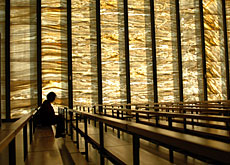Church admits “complicity” in sex abuse case

The case of a Swiss priest who was moved to France by superiors who knew he had already sexually abused at least one child is rocking the Swiss Catholic Church.
On Monday the Swiss Bishops Conference announced it would review its directives for handling suspected cases of paedophile crimes by priests.
It comes after a high-ranking church official described as “complicit” the Church’s failure to denounce the priest to civil authorities when it became aware as early as 1989 that he was a paedophile.
In an interview with Le Matin newspaper on Sunday, Nicolas Betticher of the diocese of Lausanne, Geneva and Fribourg, explained how the Church moved the priest from Switzerland to Grenoble in France, where he admits sexually touching at least one child, his then 12-year-old nephew, in 1992.
French authorities are now investigating the 67-year-old Capuchin priest, who has lived in the Montcroix monastery in Delémont, northern Switzerland, for two years. He has not yet been arrested.
The Swiss authorities in canton Jura are also looking into whether they can still prosecute the priest for other crimes he is suspected of committing in Switzerland.
He is not the only paedophile priest identified in French-speaking Switzerland. Betticher said there were three other cases “to our knowledge”.
In December the diocese made three of them public, including the current case, and paid compensation to the victims. It is believed the victim in the fourth case never made a formal claim for compensation.
The latest case is just one of a long series of accusations of child sexual abuse made against Roman Catholic priests and related Church cover-ups made around the world (see box).
“Swept under the carpet”
“We have to reassess the situation,” Walter Müller, spokesman for the Swiss Bishops Conference, told swissinfo on Monday.
“The current guidelines involve a thorough selection process for those who want to be counsellors, keeping suspicious people away from pastoral care and better monitoring throughout the apprenticeship. This was not the case previously.”
He added: “At the time we thought [paedophilia] was a question of education, of conscience. That was probably somewhat naive. We now know that paedophilia is hard to treat with therapy and the level of recidivism is high.”
Müller admitted the Church simply had swept the assaults “under the carpet”.
“We accepted a promise from those involved [not to repeat the offence] and just moved them elsewhere – as in the current case.”
He said the Swiss Bishops Conference intended to re-examine its guidelines and adapt them if necessary.
Zero tolerance
Colette Marti, responsible for the “No sexual violence against children” campaign at the Swiss association for the protection of children, welcomed the Church’s comments.
“This admission of guilt is definitely a positive gesture. It is a signal to the public – an institution such as the Church is saying, ‘We do not accept such behaviour’,” she told swissinfo.
“Having zero tolerance of sexual abuse against children and of cover-ups – that is one of the most important preventive measures.”
She acknowledged that work in this area was just beginning. “It is important that everyone who works in the Church is made aware of the problem.”
swissinfo
The paedophile priest scandal first erupted in Boston in 2002 when many leaders of the archdiocese were found to have moved priests who abused minors to new parishes instead of defrocking them or reporting them to authorities.
The scandal then spread to almost every US Catholic diocese. It led to dozens of lawsuits, millions of dollars in payments to victims and the defrocking, resignation and jailing of priests.
In July the Catholic Archdiocese of Los Angeles agreed to pay $660 million (SFr730 million) to 500 victims of sexual abuse dating back as far as the 1940s. Sexual abuse scandals have also hit Roman Catholic Churches in Ireland and other countries.

In compliance with the JTI standards
More: SWI swissinfo.ch certified by the Journalism Trust Initiative











You can find an overview of ongoing debates with our journalists here . Please join us!
If you want to start a conversation about a topic raised in this article or want to report factual errors, email us at english@swissinfo.ch.